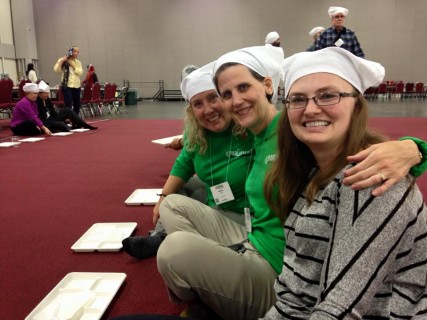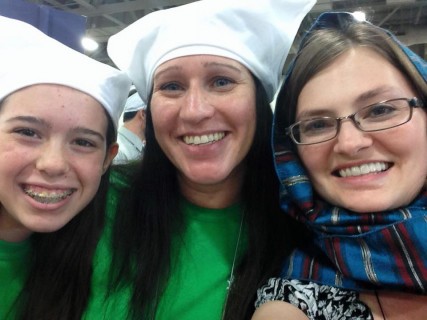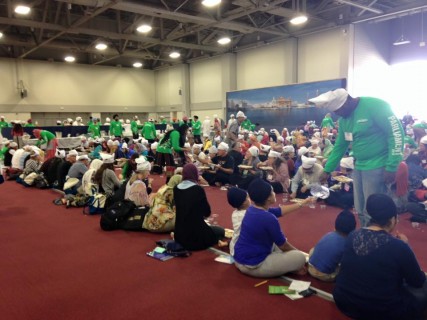By Emily Geddes
Each day for five days in a row, I lined up with hundreds of other Parliament of the World’s Religions attendees at lunchtime. The line, stretching down the main hall of the Salt Palace Convention Center, always moved more quickly than I expected, or perhaps chatting with those in line with me – an Evangelical Christian from Asia presenting on youth programs one day, a Sikh from London telling us the history of langar another – just made it seem to move faster.
Once inside the exhibit hall, transformed temporarily into a langar, I’d remove my shoes and place them side by side on a temporary plywood shelf, noting carefully how it was numbered so I could find them again later. While waiting, the entrancing scent of curry wafted over making my mouth water.
Padding along the red carpet, attached to the concrete floor with duct tape, I skimmed the displays about the 5Ks of Sikhism and the Golden Temple in Amritsar, India. Sometimes, a small group of Sikhs sat in front of the model of the Golden Temple and played beautiful traditional music.
Dressed in white, Sikh women smiled as they placed white coverings on our heads (for those who didn’t already have head coverings) and others ushered us around the edges of the carpet and directed us to sit down cross-legged in neat lines.
 Adults and children roamed up and down the lines with aluminum pails scooping delicious food onto the outstretched trays. A rich lentil stew one day, a divine spinach and cheese curd entrée the next, roasted vegetables another, every day provided a variety of smells and flavors. The mango lassi – nectar of the gods! – was a constant, as was the yogurt and the lightly seasoned rice, and always some fruit or salad too. And the naan – oh my goodness, the incredible naan! Seconds were ladled out generously, with a gentle caution to “please eat all you take so as not to be wasteful”.
Adults and children roamed up and down the lines with aluminum pails scooping delicious food onto the outstretched trays. A rich lentil stew one day, a divine spinach and cheese curd entrée the next, roasted vegetables another, every day provided a variety of smells and flavors. The mango lassi – nectar of the gods! – was a constant, as was the yogurt and the lightly seasoned rice, and always some fruit or salad too. And the naan – oh my goodness, the incredible naan! Seconds were ladled out generously, with a gentle caution to “please eat all you take so as not to be wasteful”.
A well-oiled machine, the Sikhs fed thousands in their temporary langar over the course of those five days and donated tons of food to feed Salt Lake City’s homeless as well. Unfailingly kind and welcoming, they accomplished a monumental task feeding so many while asking for nothing in return, no fee was charged, no donation basket passed.
One of the most beautiful aspects of the Parliament of the World’s Religions was finding so many points of commonality with good people of different faiths all over the world.
 Seva, or selfless, voluntary service, is a key tenet of Sikhism and the langar, providing free food to all in an egalitarian setting, is a major demonstration of that value. Sikhs teach that serving others and thinking of God at all times creates compassion and contentment, which bring us closer to God. Similarly, as a member of The Church of Jesus Christ of Latter-day Saints, at baptism I accepted the charge to “bear one another’s burdens, that they may be light” and “mourn with those that mourn…and comfort those that stand in need of comfort” (Mosiah 18:8-9). I pledged to follow Christ and to serve others, hopefully developing those same attributes of compassion and contentment.
Seva, or selfless, voluntary service, is a key tenet of Sikhism and the langar, providing free food to all in an egalitarian setting, is a major demonstration of that value. Sikhs teach that serving others and thinking of God at all times creates compassion and contentment, which bring us closer to God. Similarly, as a member of The Church of Jesus Christ of Latter-day Saints, at baptism I accepted the charge to “bear one another’s burdens, that they may be light” and “mourn with those that mourn…and comfort those that stand in need of comfort” (Mosiah 18:8-9). I pledged to follow Christ and to serve others, hopefully developing those same attributes of compassion and contentment.
I recently accepted the calling of Compassionate Service Leader in my LDS ward, a position that often involves arranging for members of the congregation to provide meals to families during times of illness or need or after a baby is born, for example. We Mormons do like to feed people! Just yesterday evening I loaded up a container of taco soup with all the fixings, canned peaches, and apple juice to take to a friend whose beautiful baby girl made her appearance in the wee hours of Thursday morning. Those first few days are exhausting and draining and a simple meal can help bear burdens and provide comfort, strengthen friendships, and increase compassion and contentment, benefitting both the people being served and those serving.
Whether on a grand scale like feeding thousands at the Sikh langar at Parliament, or on a small scale taking a meal to a family of five down the street, feeding the body and feeding the soul are intertwined and demonstrate a commitment shared across faiths to serve.








